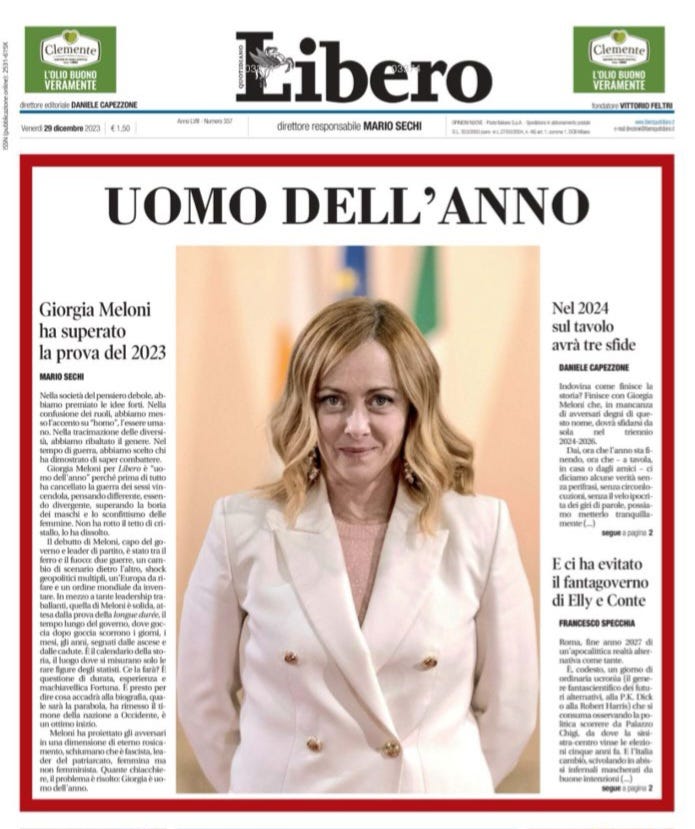A powerful speech in NZ’s parliament, setbacks in Bhutan, a new guide to combat violence, and more: All you need to know about women in politics from Dec-Jan
#WomenLead (Issue 146): Your monthly round-up on women in politics
Hello, and welcome to the first #WomenLead edition (a packed one at that) of 2024!
We bring you a quick wrap of all the important and noteworthy updates on women in politics from December 2023 and January 2024. It ain’t an easy task with so much happening, but we’ve been at it. Hope you’ll find the edition worth your time.
But before we begin, we almost thought this was a spoof, but it looks like it’s not. Italian Prime Minister Giorgia Meloni has been named “Man of the Year” by a newspaper in the country.
The fun is in the details. The newspaper, Libero Quotidiano Daily, chose Meloni as she had “won the ‘war of the sexes’ in Italy”. It also said that Meloni had not just broken the glass ceiling, in fact she had “dissolved it”! Find out more here.
Election Watch
Tracking women among candidates and winners
🇧🇩 BANGLADESH: The big election year has started. Bangladesh went to polls on Jan 07. No surprises. Incumbent PM Sheikh Hasina was voted back to serve her fifth term as PM in an election boycotted by the opposition. As we have noted previously, Bangladesh is a rare country that has had a woman at the helm for the majority of its existence. But that hasn’t translated to equitable representation of women in Parliament. Women made up only 4.9 percent of all candidates, and just 20 women have been elected to the 300-seat Parliament this January, IPU data shows. That’s lower than the number of women in the outgoing legislature – 22.
🇷🇸 SERBIA: In December, Serbs went to polls to elect a fresh Parliament. Ninety-five women were elected as MPs, together comprising 38 percent of all members, marginally lower than in the outgoing House (38.8 percent), IPU data shows. Read more in Euractiv here.
🇨🇩 DEMOCRATIC REPUBLIC OF CONGO: In the December election in DRC, 61 women were elected to Parliament’s lower house, comprising 12.2 percent of all MPs elected. This was a small improvement from the share of women in the previous legislature (10 percent). Read the perspectives of some female candidates who contested the polls in DW here.
🇧🇹 BHUTAN: Only two women were elected to Bhutan’s National Assembly, the lower house of Parliament, comprising 4.3 percent of all MPs, representing an all-time low. That was a sharp reduction from their share in the outgoing legislature (14.9 percent). This follows the election of only one woman to the 20-member upper house in 2023.
🇪🇸 SPAIN: Mar Galcerán, who has been elected to the regional assembly in Spain’s Valencia, has become the first person with Down’s Syndrome to get elected as a member of a regional (or national) legislature. Read about her political journey in The Guardian here.
Leaders
Updates about women leading countries, states, parties and movements
Hana Rawhiti Maipi-Clarke, who became the youngest-ever MP elected to the New Zealand Parliament last year, began her term on a distinct and powerful note. Maipi-Clarke, who is from the indigenous Maori community, used her maiden speech to criticise the policies of the government. She began her speech with haka, a traditional dance of the Maori people, a video of which went viral online around the world.
“I was given some advice before making it into Parliament, to not take anything personally or it'll eat you up. Well, I can't help but take everything personally that has been said in this Chamber. In only a couple of weeks, in only 14 days, this Government has attacked my whole world from every corner. Health, taiao, wai, whenua, natural resources, Māori wards, reo, tamariki, and the right of me and you to be in this country under Te Tiriti. How can I not take anything personally when it feels like these policies were made about me?”
Tomoko Tamura has been appointed the chair of Japan’s Communist Party, becoming the first woman to reach that position within the party, Nikkei Asia reported.
In October last year, Maria Corina Machado was chosen as Venezuela’s Opposition presidential candidate in an independently run primary election to challenge long-time incumbent President Nicolas Maduro in polls scheduled for later this year. However, even before she was chosen, the Venezuelan government announced a 15-year ban on her running for office. One of the allegations against her was that she supported the international sanctions against Maduro’s government. The country’s Supreme Justice Tribunal has upheld the ban.
Rukchanok Srinork, an MP in Thailand, has been sentenced to six years in prison for insulting the monarchy on social media. The posts included a tweet criticising the decision to give the contract for manufacturing Covid-19 vaccines to a company owned by the King, and another retweet of an old anti-monarchy comment.
On-the-job updates
Spotlighting women’s experiences in political office
Bae Hyun-jin, a South Korean MP from the ruling party, was attacked with a rock by a 14-year-old boy. Security camera footage shows the boy meeting Bae inside the hallway of a building, striking conversation with her, and then repeatedly hitting her on the head with a small rock as she tries to protect herself. While the attack left Bae wounded, luckily, she managed to escape a serious injury. Read more here.
In Taiwan, Yaung Chih-liang, a former health minister, called Rosalia Wu, an MP from the DPP party, “useless” while campaigning for Chang Szu-kan, a fellow member of his party. And what was he alluding to, in case you’re wondering?
Yaung accused Rosalia of being useless for not being able to have children at her age (50 years). “She is useless now, at nearly 50 [years old], she cannot bear any children. She will have no kids and no grandchildren”, are the golden words of the man, who managed to make a misogynist, ageist, senseless, illogical, and completely irrelevant statement, all in one go (quite a remarkable feat we’d say). This is not a first for the man, of course, neither did he stop at just that remark during the rally. And of course, no surprises, he also refused to apologise, wondering why Rosalia was being so “fragile”? (!!!)
Policy Watch
Because policy shifts matter
Bosnia and Herzegovina’s Congress has launched a practical guide on preventing and combating sexism in local politics. The guide provides guidance on recognising, preventing and addressing sexism before, during and after elections. It also includes examples of good practices, such as codes of conduct and regulations that can be adopted by municipalities, and mentions examples of possible sanctions against perpetrators of the violence, as well as remedies for those who have been targeted by it. Read more here.
Reading List
The more one learns, there’s only more to learn
“Campaign costs impeding women’s political representation in Indonesia”: The University of Melbourne
“Saving representative democracy from online trolls”: The Strategist
“Life on the campaign trail, with kids”: Politico
“What women need to succeed in panchayat elections”: India Development Review
“Balochistan’s women politicians struggle for representation: Battling bias, funding barriers, and low turnout”: Tribal News Network
“Feminism in pictures: illustrated stories of women’s rights around the world”: The Guardian
Community Watch
A quick round-up from the community working at the intersection of gender x politics
In the UK, the Jo Cox Civility Commission has identified a range of practical recommendations to tackle the abuse and intimidation of elected representatives. The Commission is run by the Jo Cox foundation, founded in the memory of Helen Joanne Cox, a British MP, who was brutally murdered ahead of the Brexit referendum in 2016. You can read/endorse the recommendations here.
- , an excellent weekly curation of global headlines and events, is inviting op-ed pitches. Know more here.
That’s a wrap for this month! Liked this edition? Then press the ❤️ button and show us some love! And please, please do share this with a friend or on your social media accounts. There’s frankly nothing quite like reader love and endorsement, so please keep it coming! Thank you!
Disclaimer: #WomenLead is a non-partisan newsletter produced in a personal capacity, and does not reflect any institutional affiliation/opinion. In case of any questions, please drop in a message at womenlead.project@gmail.com





